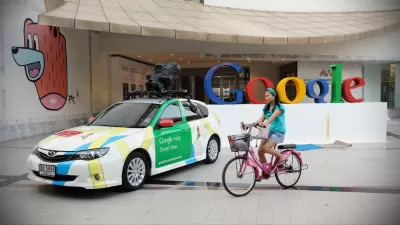The design reveal is more than just a showcase for architects Bjarke Ingels and Thomas Heatherwick. The project also raises tough questions about how far suburban cities in the South Bay Area are willing to go to support the current tech boom.
A New York Times article by Conor Dougherty first turned up the volume on talk about Google's new headquarters last week. According to Dougherty, "[the] project in Mountain View, which Google has not made public but has discussed with members of the City Council, is likely to aggravate an increasingly testy relationship between the company and community leaders who fear the company is overrunning their small city."
The problem created by the Google's continue expansion, according to city leaders, is too many jobs. The growth of tech companies is a controversial trend in many of the area's suburban municipalities: "The same story is playing out across Silicon Valley. In Menlo Park, home of Facebook, the November election featured a measure — ultimately rejected by voters — that would have cut downtown office growth in half. Citizen groups in nearby Palo Alto have rebranded their City Council’s most anti-development members as 'residentialists.'"
The article goes on to preview more holistic questions about housing and transportation infrastructure that the city's newly elected council will have to consider in the coming years.
Later in the week, Amy Frearson detailed the design proposal—which has the attention of the design and architecture media thanks to the projects to high-profile architects: Thomas Heatherwick and Bjarke Ingels. Here's how Frearson describes the project proposal: "The concept for Google North Bayshore is to create lightweight block-like structures that can be moved around, rather than investing in permanent buildings. According to Google, this will offer flexibility as the company invests in new product areas."
FULL STORY: Google Plans New Headquarters, and a City Fears Being Overrun

Alabama: Trump Terminates Settlements for Black Communities Harmed By Raw Sewage
Trump deemed the landmark civil rights agreement “illegal DEI and environmental justice policy.”

Study: Maui’s Plan to Convert Vacation Rentals to Long-Term Housing Could Cause Nearly $1 Billion Economic Loss
The plan would reduce visitor accommodation by 25% resulting in 1,900 jobs lost.

Planetizen Federal Action Tracker
A weekly monitor of how Trump’s orders and actions are impacting planners and planning in America.

Wind Energy on the Rise Despite Federal Policy Reversal
The Trump administration is revoking federal support for renewable energy, but demand for new projects continues unabated.

Passengers Flock to Caltrain After Electrification
The new electric trains are running faster and more reliably, leading to strong ridership growth on the Bay Area rail system.

Texas Churches Rally Behind ‘Yes in God’s Back Yard’ Legislation
Religious leaders want the state to reduce zoning regulations to streamline leasing church-owned land to housing developers.
Urban Design for Planners 1: Software Tools
This six-course series explores essential urban design concepts using open source software and equips planners with the tools they need to participate fully in the urban design process.
Planning for Universal Design
Learn the tools for implementing Universal Design in planning regulations.
Caltrans
Smith Gee Studio
Institute for Housing and Urban Development Studies (IHS)
City of Grandview
Harvard GSD Executive Education
Toledo-Lucas County Plan Commissions
Salt Lake City
NYU Wagner Graduate School of Public Service




























